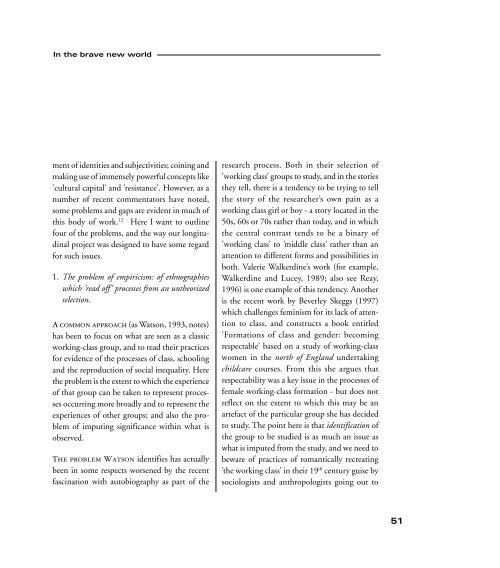Ladda ner utgåvan. - Fakultet för lärarutbildning - Umeå universitet
Ladda ner utgåvan. - Fakultet för lärarutbildning - Umeå universitet
Ladda ner utgåvan. - Fakultet för lärarutbildning - Umeå universitet
You also want an ePaper? Increase the reach of your titles
YUMPU automatically turns print PDFs into web optimized ePapers that Google loves.
In the brave new world<br />
ment of identities and subjectivities; coining and<br />
making use of immensely powerful concepts like<br />
’cultural capital’ and ’resistance’. However, as a<br />
number of recent commentators have noted,<br />
some problems and gaps are evident in much of<br />
this body of work. 12 Here I want to outline<br />
four of the problems, and the way our longitudinal<br />
project was designed to have some regard<br />
for such issues.<br />
1. The problem of empiricism: of ethnographies<br />
which ’read off’ processes from an untheorized<br />
selection.<br />
A common approach (as Watson, 1993, notes)<br />
has been to focus on what are seen as a classic<br />
working-class group, and to read their practices<br />
for evidence of the processes of class, schooling<br />
and the reproduction of social inequality. Here<br />
the problem is the extent to which the experience<br />
of that group can be taken to represent processes<br />
occurring more broadly and to represent the<br />
experiences of other groups; and also the problem<br />
of imputing significance within what is<br />
observed.<br />
The problem Watson identifies has actually<br />
been in some respects worsened by the recent<br />
fascination with autobiography as part of the<br />
research process. Both in their selection of<br />
’working class’ groups to study, and in the stories<br />
they tell, there is a tendency to be trying to tell<br />
the story of the researcher’s own pain as a<br />
working class girl or boy - a story located in the<br />
50s, 60s or 70s rather than today, and in which<br />
the central contrast tends to be a binary of<br />
’working class’ to ’middle class’ rather than an<br />
attention to different forms and possibilities in<br />
both. Valerie Walkerdine’s work (for example,<br />
Walkerdine and Lucey, 1989; also see Reay,<br />
1996) is one example of this tendency. Another<br />
is the recent work by Beverley Skeggs (1997)<br />
which challenges feminism for its lack of attention<br />
to class, and constructs a book entitled<br />
’Formations of class and gender: becoming<br />
respectable’ based on a study of working-class<br />
women in the north of England undertaking<br />
childcare courses. From this she argues that<br />
respectability was a key issue in the processes of<br />
female working-class formation - but does not<br />
reflect on the extent to which this may be an<br />
artefact of the particular group she has decided<br />
to study. The point here is that identification of<br />
the group to be studied is as much an issue as<br />
what is imputed from the study, and we need to<br />
beware of practices of romantically recreating<br />
’the working class’ in their 19 th century guise by<br />
sociologists and anthropologists going out to<br />
51

















